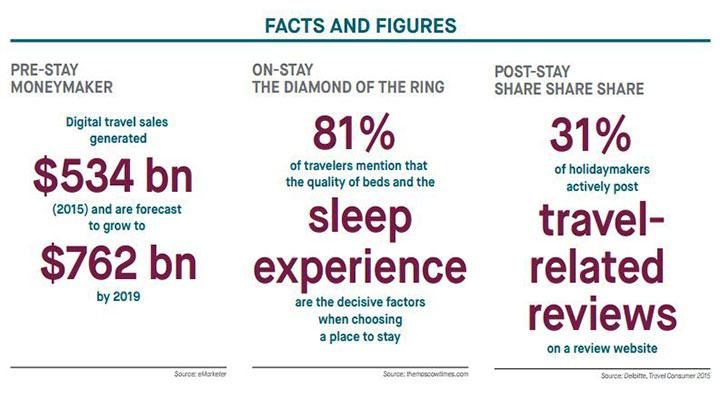By 2030, multiple changes will occur and will influence the hospitality industry due to globalisation, one of them being a shift of market power. In the fourth thesis of the Lausanne Report, EHL – in cooperation with hospitality experts – discuss this trend that will disrupt the industry depending on the economic stages of a market and its geographical position.
#4 THE EMOTIONAL EXPERIENCE
The main challenge of hospitality managers of the future is to improve guest experience, which involves perceptions and emotions. Customers may react in many different ways and the experience must therefore be carefully thought of and created. In a high tech world, people are longing for balance. The answer to high tech is high touch – that is emotions.
Download the fourth thesis of the Lausanne Report now!
SCENARIO A: HIGH TECH SHAPES GUEST EXPERIENCE
The age of intelligent interaction between humans and machines started due to technology. This convergence is also known as the "second economy" or "third wave". It is expected that high tech will take control over the next 20 years to come.
Here are some key High Tech rationales:
- The "second economy", which is based on the Internet of Things (IoT), is the key element to enable the digitalisation of the overall economy
- A higher vertical and horizontal integration of the supply chain will be possible as a result of the "second economy"
- IoT will create physical devices, sensors and processors "intelligent", which will be based on CIBPs – Customer Integrated Business Processes
SCENARIO B: HIGH TOUCH DEFINES EMOTIONS
It is a fact that technology is taking a big part in our lives, but guests still search for authencity and human interaction. High Tech might not fully satisfy visitors without a touch of emotions.
Here are some key High Touch rationales:
- The ability of tracking and predicting emotions will be the key success factor for a hospitality business
- The way people act, live, and behave is significantly influenced by their emotions
- Humans are not rational decision-makers, but are instead influenced by their emotions, which can constantly change
- Being holistically appreciated is part of a guest experience, as customers feel the need to see that hoteliers know their desiresand moods
- Staff need to be "Stage directors" in order to provide their guests an unforgettable experience
Are you impatient to discover the full report? Order it now!
LET'S CO-EXIST In guest relations, dealing with emotions is more problematic and challenging than not being able to offer the lowest price. A hotel’s ability to stimulate emotions puts it into a position of power and therefore of responsibility. To fulfill their promise, brands have to offer their guests authenticity ,and sustainable and consistent services. New technology-enabled services have to be used in a reasonable and non-manipulative manner to deliver a real added value. The new «emotional transparency» based on big data will also provide sensitive data that guests do not want to be disclosed and used for analytics as they touch privacy. The selection of data will be a challenge. Even if today it is widely accepted that privacy is no longer an issue, there will be a counter trend. Guests will change their minds during their different stages of life and insist on the protection of their privacy.



